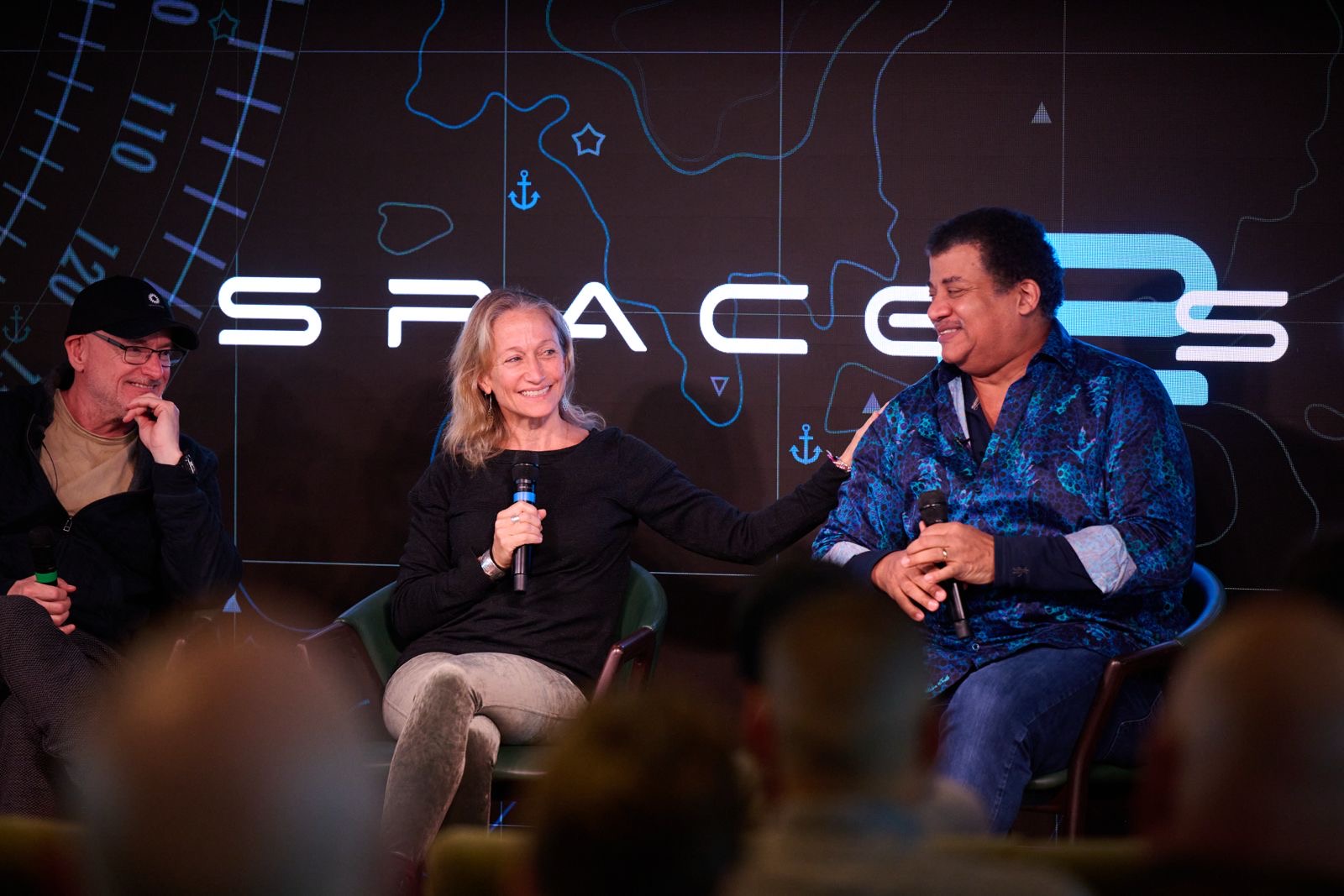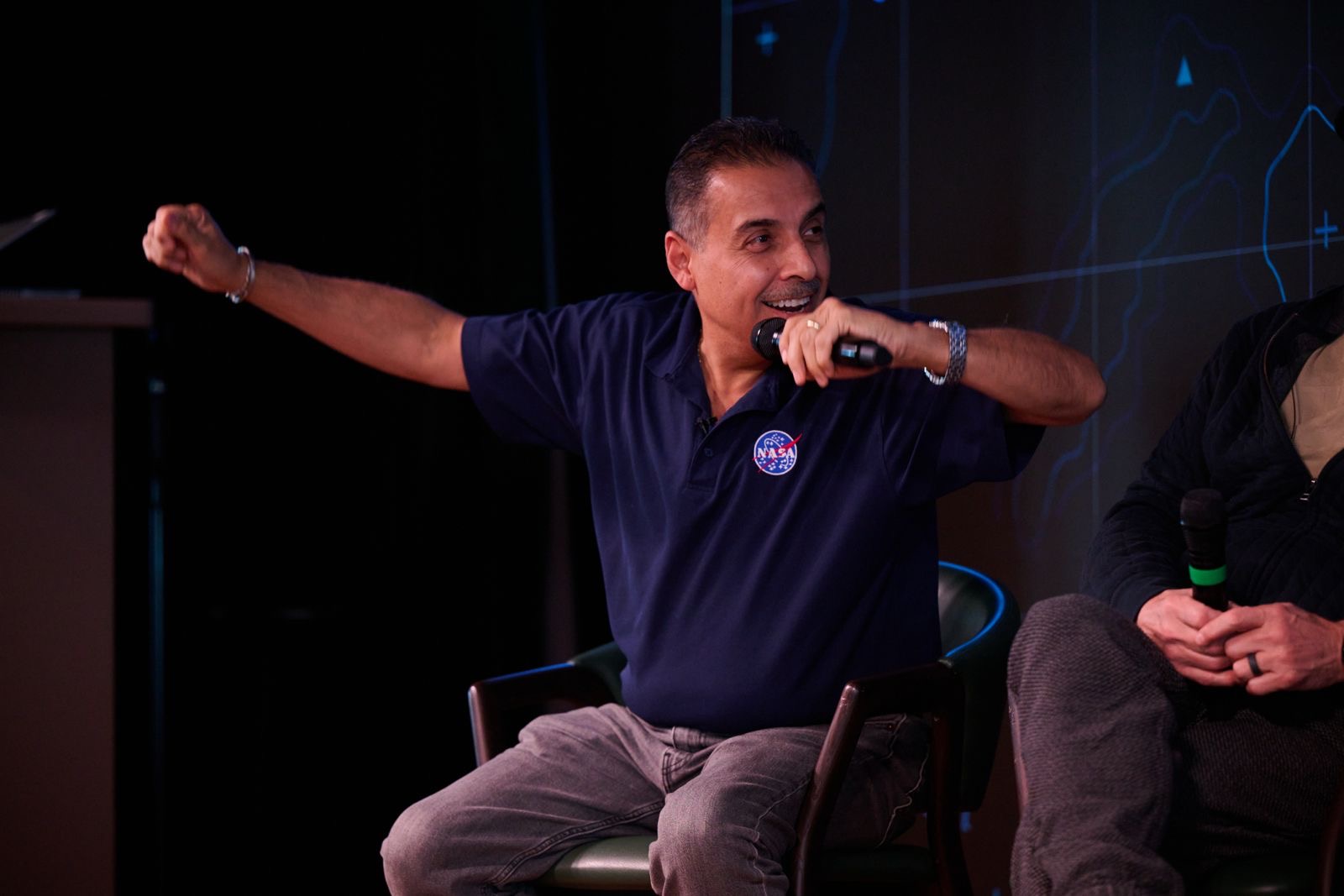Space2Sea Antarctica marks the inaugural voyage in a collection produced by FUTURE of SPACE (FoS). This revolutionary journey blends Earth’s uncharted territories with the inspiring narrative of human curiosity and exploration. It encapsulates the core mission of FoS to: Embrace New Frontiers, Rejoice the Human Expertise, and Elevate the Dialog. Scholar journalist Gabe Castro-Root of American College is chronicling the mission for FoS. You may learn his newest dispatch under.
Astronauts, scientists and explorers gathered aboard an Antarctica-bound ship on Friday for a panel dialogue aimed toward inspiring younger folks’s curiosity concerning the ocean, outer area and their very own backyards.
College students in 46 international locations had been set to tune in to the dialog’s reside stream, in response to Way forward for House, the Antarctica expedition organizer. Daniel Fox, co-founder of Way forward for House, mentioned it was the first-ever reside broadcast from the Drake Passage, the notoriously turbulent stretch of ocean between South America and the Antarctic Peninsula.

The audio system — astrophysicist Neil deGrasse Tyson, “Star Trek” actor William Shatner, filmmaker Céline Cousteau and astronauts Scott Kelly and José Hernández — shared tales of their very own early pursuits in exploration and answered questions despatched in from college students world wide. The panel was moderated by Janet Ivey, host of the kids’s tv present “Janet’s Planet” on PBS.
Tyson, maybe the world’s best-known science communicator, mentioned in response to a query from a 15-year-old in Finland that he first realized his knack for explaining advanced ideas in eighth grade math class. When college students didn’t perceive the instructor’s description of a matrix, Tyson tried explaining it in his personal approach. For the opposite college students, he mentioned, it clicked.
“What I spotted is, if I am ever tasked with explaining one thing, the job of the individual understanding it’s on me,” he mentioned. “It is not their accountability to know what I’m saying. It’s my accountability to have them perceive.”
He mentioned that dedication to understanding stays the driving pressure behind the prolific profession he has constructed as a communicator.

“I’d relatively simply keep dwelling within the lab, however I really feel a way of obligation to carry the universe all the way down to Earth for all those that are curious, as a result of I can,” Tyson mentioned. “And if I didn’t, it could be disrespect for individuals who did it for me after I was developing within the ranks.”
Cousteau highlighted a second when she encountered a humpback whale whereas diving off the coast of Hawaii.
“I felt extremely small, and that sense of feeling extremely small I want upon all of you as a result of it actually places you in perspective of what we’re,” she mentioned.
However she additionally emphasised that exploring does not require going deep within the ocean or out to area. “We don’t have to go distant,” she mentioned, including that curiosity can occur anyplace.
At instances, the dialog become a lighthearted debate over whether or not it was tougher to unravel the ocean or into area.

And whereas the main target was totally on the awe of pushing new frontiers within the identify of curiosity, Kelly additionally defined a number of the bodily challenges he confronted throughout and after his area missions — rashes, lack of blood quantity, legs that will “swell up like water balloons.”
“You are not being ambassador for folks to enter area,” Tyson teased him at one level.
A second dialog that afternoon, that includes many of the identical audio system and moderated by journalist Ann Curry, centered extra on the science, but additionally sensible constraints, behind advances in area journey and the potential of people in the future colonizing one other planet or moon.
“Antarctica is hotter, balmier and wetter than anyplace on Mars, but nobody’s lining as much as construct condominiums right here,” Tyson mentioned. “To dream is one factor, however on the finish of the day someone’s gotta write the test to make it occur. The individuals who write the checks have completely different motivations from those that do the dreaming, and barely do they align.”
Kelly mentioned his brother, Senator Mark Kelly of Arizona and one other former astronaut, usually mentioned getting people to Mars is “not about rocket science, it’s about political science.” Funding and curiosity from politicians are larger obstacles than engineering, he mentioned.
“Nonetheless dangerous we make this planet, it is at all times going to be simpler to reside right here than on Mars,” Kelly mentioned. “However I nonetheless do consider we must always go to Mars, and I believe we’ll sometime.”
Requested by a pupil from Iran about recommendation for changing into the primary individual to journey “to Mars and past,” Shatner inspired younger folks to make use of the thought of area journey to encourage them to deal with their schooling.
Kelly agreed, explaining that he struggled to seek out motivation in class earlier than he learn “The Proper Stuff,” the 1979 e book by Tom Wolfe that chronicles postwar improvement of rocket-powered plane.
And Hernández, who utilized to turn out to be an astronaut 11 instances earlier than NASA chosen him, reminded college students to remain persistent and optimistic within the face of daunting challenges.
“I at all times inform of us that it’s okay to dream large,” he mentioned. “I encourage of us to dream large. However that you must again it up with exhausting work and preparation.”
This text was offered by Space2Sea Antarctica and FUTURE of SPACE. For extra info on the expedition and FoS go to the Space2Sea Antarctica expedition web site, and the FUTURE of SPACE initiative.



